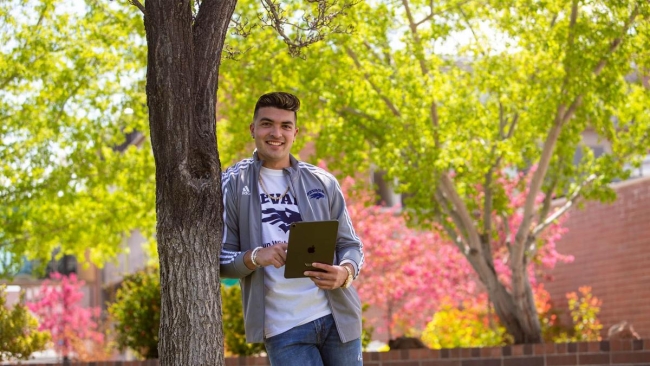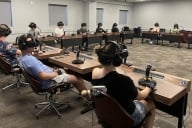You have /5 articles left.
Sign up for a free account or log in.

Courtesy of the University of Nevada, Reno
The University of Nevada, Reno, is the latest U.S. university to offer all incoming first-year students free iPads and educational opportunities as part of a new deal with tech giant Apple.
The Apple agreement plays a central role in Reno’s Digital Wolf Pack Initiative -- an institutionwide plan to increase digital equity and digital literacy on campus.
“If the pandemic has taught us anything, it is that there is a digital divide facing many of our students and that we need to do a better job of promoting digital equity and digital literacy,” Brian Sandoval, president of the university, tweeted last week.
When Sandoval became president in September 2020, following an eight-year stint as governor of Nevada, he wanted to make access to technology and technology education a priority for the institution. Sandoval hopes to use the partnership with Apple as a recruiting tool for future students and an example of how the institution is forward-thinking and can prepare graduates for a competitive job market.
"We want prospective students to see the University of Nevada, Reno, as at the forefront of technology," said Sandoval. He also wants to make students more marketable, "so that when they graduate, they have better job prospects."
Sandoval said the Digital Wolf Pack Initiative represents “a multimillion-dollar” investment. The funding for the program will be provided through a one-time allocation of the university's investment income, not student fees, according to an informational webpage about the initiative.
Incoming first-year students will receive an iPad Air, Bluetooth keyboard and digital pen when they come to campus this August. During an induction week for new students known as NevadaFIT, students will be given classes on how to use the devices effectively, said Jeff Thompson, acting executive vice president and provost at the institution.
The iPads, which students keep on loan until they graduate, will come equipped with a suite of productivity and creativity apps. The university plans to develop more apps specifically for use on campus over time, said Thompson. Faculty members who are teaching as part of the NevadaFIT program will also receive iPads and training from Apple education experts, he said.
Sandoval had an existing relationship with Apple when he was governor and said he was very interested when the company approached him late last year about a deal that would increase student access to devices and tech training. Before making a commitment, Sandoval said, he spoke with leaders and faculty members at Ohio State University, where a similar arrangement with Apple was announced in 2017 as part of an institutionwide initiative called the Digital Flagship program.
“I heard how transformative it was for Ohio State and their students,” said Sandoval, who is a graduate of both Ohio State and the University of Nevada, Reno. “It seemed like a fantastic opportunity.”
In the first three years of Ohio State’s collaboration with Apple, the institution distributed more than 37,000 devices to “nearly 70 percent of our undergraduate student population across all six campuses,” a spokesman for the university said via email.
Ohio State expects 95 percent of its undergraduate population of over 53,500 students to have a free Apple device by this autumn.
What started as a pilot is “no longer a short-term initiative, but a strategic student success program that is ingrained in the university experience,” said the Ohio State spokesman. “This program is likely to continue with a focus on deeper integration into curriculum, degree programs, student success support, student life, and workforce development.”
A spring 2020 survey conducted by Ohio State's Center for the Study of Student Life found that 94 percent of students agree or strongly agree that the iPad is a valuable tool for their education.
"The iPads proved invaluable in the shift to remote learning during the pandemic, often serving as students' primary device for learning," said the Ohio State spokesman.
Just one other land-grant university, the University of Kentucky, has since struck a similar deal with Apple.
"We were fortunate that we started working with Apple when we did," said Abbie Loynachan, director of an institutionwide program at the university called the Smart Campus Initiative.
The university began giving iPads to incoming first-year students in fall 2019 and already had a large number of the devices ready to distribute when the pandemic was declared, said Loynachan. The iPads were provided to any student in need, not just first-year students.
Although addressing digital inequity on campus was a central aim of the collaboration with Apple, Loynachan said the arrangement has had other positive impacts. University staff and students assisted in the development of a campus app that helps students stay on top of tasks and connect with campus services such as advising. There is also increased awareness of digital teaching tools among faculty members, she said.
The success of initiatives at Ohio State and Kentucky may serve as a model for other institutions that want to work with Apple.
Following the announcement of the Ohio State collaboration in 2017, Tim Cook, Apple’s CEO, told The Columbus Dispatch that the institution would “set an example I hope many others will follow.”
When both the Ohio State and Kentucky initiatives were launched, there was some grumbling on social media from students who were not initially eligible to get an iPad. The situation at Reno is no different, with some students expressing criticism that they just made it through a very difficult year because of COVID-19 and want the same privileges.
It would be difficult, not to mention expensive, to give every student and faculty member a device, said Thompson. The upcoming year will be treated as a pilot program, with a task force created for faculty and students to give their feedback on the value of the program and whether it should be expanded to others, he said. Laptop and device rentals, including Wi-Fi hotspots, will continue to be available to all students on request, he said.
There is some concern among faculty about how they will adapt to teaching with Apple software, but there is also excitement, said John Nolan, a lecturer in management at Reno's College of Business.
"People say higher ed is resistant to change, but a lot of things have changed over the past year," said Nolan. He added that the institution, like many others, is concerned about future enrollment numbers and needs to "stay relevant" to keep attracting students.
"I think we're very lucky to have President Sandoval," said Nolan. "You have to be willing to go out to talk to people to make these types of partnerships, and this agreement with Apple is a big deal."








